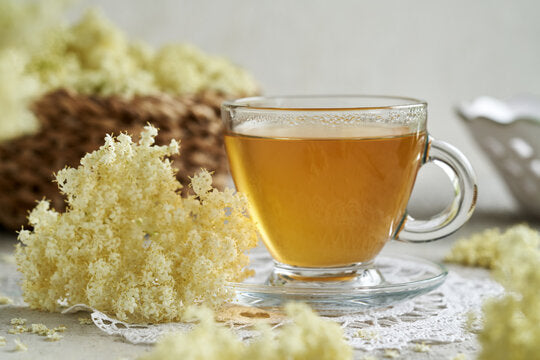The Floral Elegance of Elderflower Tea: A Refreshing and Soothing Brew

In the realm of herbal teas, few possess the delicate floral charm and soothing properties of elderflower tea. With its subtle yet distinct flavour profile, elderflower tea has been cherished for centuries for its refreshing taste and potential health benefits. From its humble origins in traditional medicine to its modern resurgence as a popular beverage choice, elderflower tea continues to captivate tea enthusiasts worldwide. Join us as we explore the floral elegance of elderflower tea, its rich history, benefits, and why it deserves a place in your daily routine.
A Brief History:
Elderflower, derived from the flowering plant known as Sambucus nigra, has a long and storied history in herbal medicine and culinary traditions. Native to Europe, elderflower has been used for centuries by various cultures for its medicinal properties and culinary versatility. The ancient Greeks and Romans valued elderflower for its purported healing abilities, while in medieval Europe, it was believed to ward off evil spirits and protect against illness.
In traditional folk medicine:
Elderflower was commonly used to treat colds, flu, and respiratory infections due to its purported anti-inflammatory and immune-boosting properties. Additionally, elderflower was prized for its ability to promote detoxification and support overall health and well-being.
Over time, elderflower's popularity spread beyond medicinal use to culinary applications. The delicate floral flavour of elderflower became a staple ingredient in various beverages, desserts, and jams, adding a subtle yet distinctive aroma and taste.
The Rise of Elderflower Tea:
In recent years, elderflower tea has experienced a resurgence in popularity as consumers seek out natural and holistic remedies for health and wellness. Unlike traditional teas made from Camellia sinensis leaves, elderflower tea is brewed from the delicate blossoms of the elderflower plant, resulting in a light and fragrant infusion.
One of the reasons for elderflower tea's popularity is its refreshing taste and versatility. Whether enjoyed hot or cold, elderflower tea offers a delightful floral aroma and a subtle sweetness that appeals to a wide range of palates. Its gentle flavour makes it an excellent choice for those seeking a caffeine-free alternative to traditional teas.

Benefits of Elderflower Tea:
Beyond its pleasing taste, elderflower tea is believed to offer a host of potential health benefits. Rich in antioxidants and flavonoids, elderflower tea may help protect against oxidative stress and inflammation, which are associated with various chronic diseases.
Moreover, elderflower tea is often used to support immune health, particularly during cold and flu season. Its natural antiviral and immune-boosting properties make it a popular choice for those looking to stay healthy and resilient.
Additionally, elderflower tea is believed to promote healthy digestion and relieve digestive discomfort. Its gentle diuretic properties may also help flush out toxins from the body, promoting detoxification and overall well-being.
For women, elderflower tea may offer particular benefits, thanks to its hormone-balancing properties. In traditional herbal medicine, elderflower was often used to alleviate symptoms of PMS and menopause, making it a valuable ally for women's health.
How to Enjoy Elderflower Tea:
For those interested in incorporating elderflower tea into their daily routine, there are several ways to enjoy this delightful brew. Elderflower tea can be made using fresh elderflower blossoms or purchased in pre-packaged tea bags for convenience.
To brew elderflower tea, simply steep a handful of fresh elderflower blossoms or a tea bag in hot water for 5-7 minutes, allowing the flavours to infuse fully. For a refreshing twist, elderflower tea can also be served over ice with a squeeze of lemon or a sprig of mint.
For added variety, consider experimenting with different flavour combinations, such as mixing elderflower tea with berry or citrus fruits for a refreshing summer beverage. The possibilities are endless, allowing you to tailor your elderflower tea experience to suit your taste preferences.
Conclusion:
In conclusion, elderflower tea stands out as a refreshing and soothing brew that offers both taste and potential health benefits. With its delicate floral aroma and gentle flavour, elderflower tea provides a welcome respite from the hustle and bustle of daily life. Whether enjoyed hot or cold, elderflower tea is a versatile beverage that can be enjoyed year-round.
As the driving force behind Mother Cuppa Tea, we are proud to offer a selection of high-quality elderflower tea blends that capture the essence of this beloved botanical. With our commitment to redefining the herbal tea experience for women, we invite you to discover the floral elegance of elderflower tea and experience the joys of natural wellness firsthand.
FAQs About Elderflower Tea
Q1. Is elderflower tea caffeine-free?
Yes, elderflower tea is naturally caffeine-free, making it an excellent choice for those looking to reduce their caffeine intake or enjoy a soothing beverage before bedtime.
Q2. Can I drink elderflower tea every day?
Yes, you can enjoy elderflower tea daily as part of a balanced diet. However, moderation is key, as excessive consumption may lead to potential side effects.
Q3. How does elderflower tea differ from elderberry tea?
While both elderflower and elderberry teas are derived from the elder tree, they come from different parts of the plant. Elderflower tea is made from the blossoms, whereas elderberry tea is made from the berries. Each offers unique flavors and health benefits.
Q4. Can elderflower tea help with allergies?
Some research suggests that elderflower tea may help alleviate symptoms of allergies due to its anti-inflammatory properties. However, more studies are needed to confirm its effectiveness fully.
Q5. Is elderflower tea suitable for children?
Elderflower tea is generally considered safe for children in moderation. However, it's always best to consult with a pediatrician before introducing new beverages into a child's diet.







Leave a comment